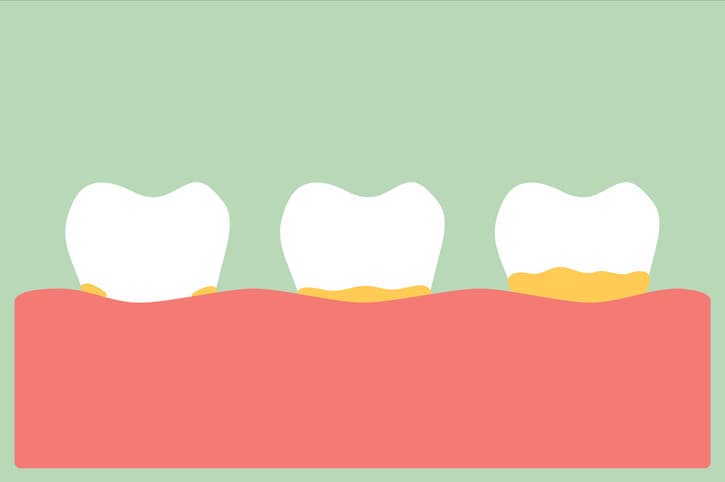
What Causes Plaque on Teeth
Your mouth contains a lot of bacteria that collect on the surfaces of your teeth and create this bacterial film, which often starts at the gumline. The development of plaque is completely normal and, to most dentists, to be expected. It’s when the bacteria mix with sugar and produces acids that a problem develops. If you eat a lot of sugary or sweet foods – or those that contain a lot of simple carbohydrates – the bacteria in your mouth actually feed on these sugars if you let them linger on the surface of your teeth.
Why You Should Care About It
Tooth decay and cavities are the first two problems that can occur if plaque on teeth is left to build up. Acids that wear away your teeth’s enamel lead to tooth decay, and if these acids aren’t cleaned off, they can continue through the dentin to the pulp of the tooth. Ignoring this plaque can eventually lead to the development of an abscess or bacterial infection inside the teeth, according to Mayo Clinic.
If you don’t brush or floss regularly, plaque can also harden into tartar – which doesn’t need much time to form. Tartar can develop in just a day if you forget to brush, and although plaque isn’t usually visible on the teeth, tartar does stain and turn brown or yellow. Along with being aesthetically unpleasant, tartar can irritate your gums, leading to gingivitis. It’s also a lot more difficult to remove than plaque, as brushing and flossing alone won’t take it off. You’ll need to see a dental professional to remove any tartar buildup.
Treating Plaque on Teeth
You can’t keep plaque from forming, but you can be proactive about removing it to avoid any negative effects and minimize the resulting tartar. Brushing your teeth twice a day – as well as flossing at least once a day to get the areas in between – will reduce the buildup of plaque before it turns to tartar and it’s out of your hands. Limiting the number of sugary foods you eat can also help you take control by keeping your mouth’s natural bacteria from spreading.
If you’re worried about plaque or tartar building up on your teeth, seeing a dentist on a regular basis is crucial. Your dentist or dental hygienist can scrape away the tartar you can’t remove yourself and inspect for signs of cavities or gum disease. You can minimize all the damage done by plaque at home, so working with your dental professionals can help make your mouth as healthy as you deserve it to be.
